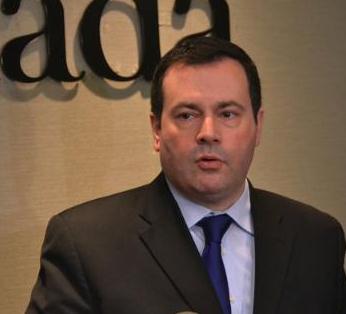
Activists have criticized Immigration Minister Jason Kenney's proposed changes to refugee policy. Credit: Rob Salerno

Parliament responded to Jamie Hubley's suicide by passing a bill to address suicide. Credit: Rob Salerno

Conservative MP Brian Storseth's controversial bill to repeal sections of the Human Rights Act passed with the support of a Liberal MP. Credit: Rob Salerno
It was as close as the House of Commons gets to bipartisanship, these days.
On the second reading of the trans rights bill, 15 Conservative MPs voted to support it with their opposition counterparts.
The minority of supportive Conservatives included a former Reform MP and a handful of Prime Minister Stephen Harper’s cabinet.
Not all were supportive, however. Dean Allison, a backbench Tory from Ontario, rehashed some of the arguments that had raised hackles in the queer community, saying the bill would give men “access to girls’ bathrooms.”
But the bill passed nevertheless. The day after, NDP LGBT critic Randall Garrison stood up to congratulate those who supported it, saying, “Together we have taken an important step toward full equality for transgender Canadians.”
C-279 will be back in the fall, when — barring a twist — the bill will finally be passed into law, ending nearly a decade’s worth of attempts to pass it.
While the tacit cooperation on the trans rights bill may have glossed a veneer over the normally acrimonious House of Commons, it wore off quickly.
The 77 sitting days of this parliamentary session saw some of the most wide-ranging and contentious legislation in Canadian history.
Veteran queer MP Libby Davies, who first won for the NDP in 1997, called this past year “brutal.” She admits that the opposition has lost many fights this past session, but notes that the process and opposition to the government’s policies has been powerful.
On the other side, the Harper government has managed to implement major pillars of its agenda, quell caucus revolts on abortion and frustrate the opposition with numerous unparliamentary actions.
Immigration woes
Over the past several months, Xtra has covered the effects that the Conservative immigration bill could have on queer refugees.
Activists say Bill C-31 hacks away much of the safety net in place now to protect refugees. More recently, it was announced that many facets of healthcare provided for refugees in Canada would be cut, including coverage for prescription drugs, dental work and eye care, among other things.
While some coverage will be expanded to some refugee claimants to fill this gap, the change will cut around $20 million a year from the healthcare program.
The changes came into effect the same day Bill C-31 was unceremoniously rushed through the Senate — which left the opposition Liberals crying foul.
On July 5, key figures at eight leading Canadian health associations sent a letter (see below) to Immigration Minister Jason Kenney urging him to reconsider plans to scale back healthcare coverage for refugees.
“Our fears that this legislation, creating a two-tier system of refugee protection in Canada, would be adopted have now been realized,” said Wanda Yamamoto, president of the Canadian Council of Refugees, in another statement released minutes after the bill became law.
While in committee, the Senate recommended that the Refugee Board of Canada develop guidelines for minorities and LGBT persons. A spokesperson for Citizenship and Immigration indicated that the government would not be following up on those recommendations.
Fighting crime
In one of the more far-reaching pieces of legislation introduced in this sitting, the government overhauled large chunks of the criminal justice system with Bill C-10.
The omnibus bill took a sledgehammer to many remaining vestiges of decades of Liberal rule.
Jordan Arsenault, a Montreal-based queer activist, launched It Could Get Worse and the website Forget the Box in opposition to the bill. It’s a project that looks at the impact the bill could have on individual Canadians. He and other collaborators filmed interviews with “Omnibusters” who conveyed their criticisms of the bill.
“All along the way it required a suspension of disbelief,” Arsenault says, recounting how little hope they had that the Conservatives would budge on the legislation — specifically, the mandatory minimum sentences.
The bill became law back in March, despite objections from several provinces. Quebec legislators went as far as to refuse many of the farther reaching aspects of the bill.
While the majority of the legislation was passed without much objection, several tenets of the bill have met fierce opposition. It, among other things, gives judges discretion to remove the publication ban that is currently mandatory on all young offenders. That, Arsenault says, is “abhorrent.”
The part that has garnered the most attention, however, is the introduction of mandatory minimum sentences for a wide variety of crimes, especially drug offences.
C-10 introduces sentences ranging from nine months to three years for possession and production of marijuana if the government deems the purpose is to traffic or export the drug. The penalties are harsher if the accused falls under the government’s lists of “aggravating factors,” which range from the use of weapons to committing the crime anywhere near youth, according to a government backgrounder.
That position on drugs, harm reduction activists told Xtra in January, is dangerous.
Suicide prevention
Duelling bills proposing a national suicide prevention framework were drawn up in this past session, coming up amidst a heated national debate about combating suicide — especially amongst queer youth — following the suicide of Jamie Hubley.
Conservative bill C-300 flew through the House with near-unanimous consent at every step.
That bill, introduced in February by backbencher Harold Albrecht, was finally punted from the House to the Senate in late June. The bill will almost certainly become law before 2012 is out.
Albrecht’s bill represents a step forward for the federal government toward federal involvement in suicide prevention. It would empower Health Canada to develop a public awareness strategy, collect and publish information on suicide, work with the provinces to establish best practices and create biennial reports about its efforts.
“When C-300 passes, we will not only track the numbers, but we’ll be able to define what prevention measures work best for local groups to adapt to their own unique situation,” Albrecht wrote in an email.
The sister bill, introduced by NDP deputy leader and health critic Megan Leslie, goes two steps further.
Bill C-297 would task Health Canada with creating a suicide surveillance program to monitor and track instances of suicide across the country, look at federal funding for mental health and anti-suicide strategies, study and use cultural and community-based tactics for combating suicide, create a program to de-stigmatize mental health services, study accessibility to mental health services, and analyze the media’s treatment of suicide.
While Albrecht’s bill received accolades and back-slapping, Leslie’s bill has yet to come before the House.
The NDP, however, sought to marry the two bills, presenting a spate of amendments to essentially give Albrecht’s bill the same scope as Leslie’s. The government shot them all down, arguing that they fell outside the scope of the bill.
“I’m a tad bitter,” says NDP deputy LGBT critic Dany Morin.
Leslie seconded Albrecht’s bill when it came before the House, and Albrecht is planning on returning the favour. With Conservative MPs allowed to vote how they like on the bill, Albrecht’s support might help Leslie eke out a victory.
Other private member’s business
This session also saw a slate of landmark private member’s bills, few of which made it anywhere.
In one of the most ideological victories for the Conservatives this year, Albertan MP Brian Storseth passed his bill — C-304 — in May. The bill would repeal sections of the Canadian Human Rights Act that govern the use of hate speech online.
The bill passed with a single opposition MP — Liberal Scott Simms — supporting it. It is now awaiting passage in the Senate. Controversial talk-show host Ezra Levant has lauded the bill.
That decision, says the NDP’s Morin, is opening a “Pandora’s box.”
Paradoxically, the House also looked at legislation that would criminalize cyber-bullying. The bill, introduced by Hedy Fry, would allow police to intervene on bullying that takes place online.
Although he supports the bill, Morin says criminalizing “might not be the best way.” He points out that much of what the bill is trying to combat is youth-on-youth bullying, and he has concerns over charging youth.
The entire opposition supported it when it came before the House, and it will be returning to the House in the fall.
Other notable pieces of legislation considered and passed this past year:
Bills that went nowhere
C-398 – The drugs to Africa bill.
This legislation would have helped Canada sell cheap, generic HIV/AIDS antivirals to Africa. A previous iteration of this bill narrowly passed the House last year, only to die in the Senate when an election was called.
C-30 – The pornographers win?
This legislation would have given unprecedented powers to the government to read Canadians’ personal online data. It was shelved indefinitely after an intensive online campaign that involved Anonymous and a rather salacious Twitter feed. It will return from the dead, we’re told.
C-285 – Protecting everyone from hate propaganda.
This NDP bill would codify protection from hate propaganda based on gender, race and sexual orientation. It made it to first reading, but with its sponsor – Irene Mathyssen – at 212 in the private member’s lottery, it seems unlikely that we’ll hear more about it in the near future.
Bills that became law
C-38 – The omnibudget strikes again.
In a massive budget that even drew criticism from the rightwing Economist magazine, the Harper government made ambitious changes to everything from environmental assessments to retirement age. The marathon vote kept MPs in the House for nearly a full 24 hours.
C-19 – The Conservatives blow away the long-gun registry.
Finally fulfilling a long-time promise, the Conservatives took the Liberals’ ill-fated long-gun registry out behind the woodshed and put it to bed.
C-11 – Locking up the entertainment industry.
The government finally succeeded in making sweeping changes to Canada’s antiquated copyright laws. It gave teeth to so-called digital locks and put in place punishments for internet service providers who do not fork over the names of copyright breakers.
C-310 – Tackling human trafficking.
The House came together unanimously to support this Conservative bill to fight human trafficking, but it didn’t go through without some partisan bickering.
C-311 – Good news for border-hopping winos.
One Tory backbencher introduced legislation to make sure wine could be transported between the provinces. No MP was foolish enough to oppose this legislation.


 Why you can trust Xtra
Why you can trust Xtra


